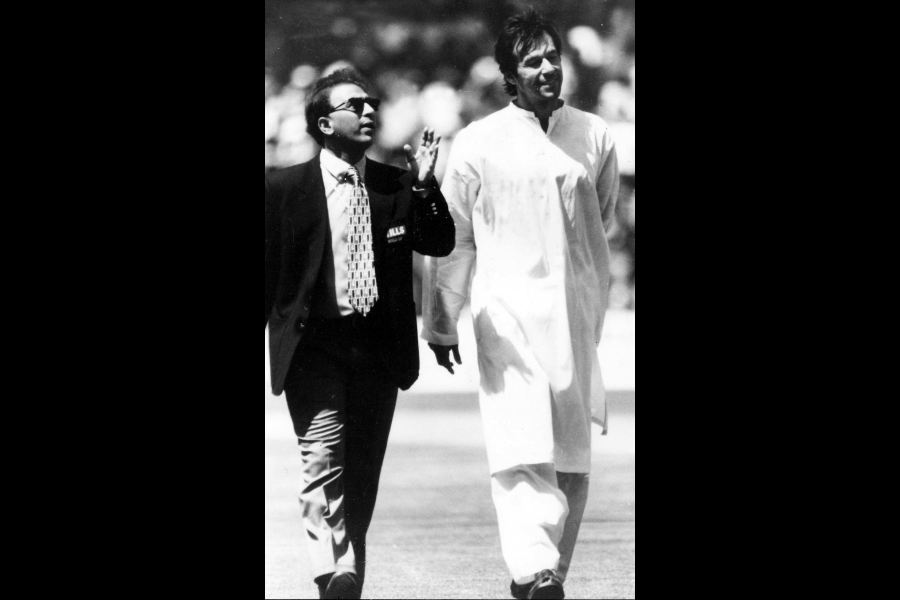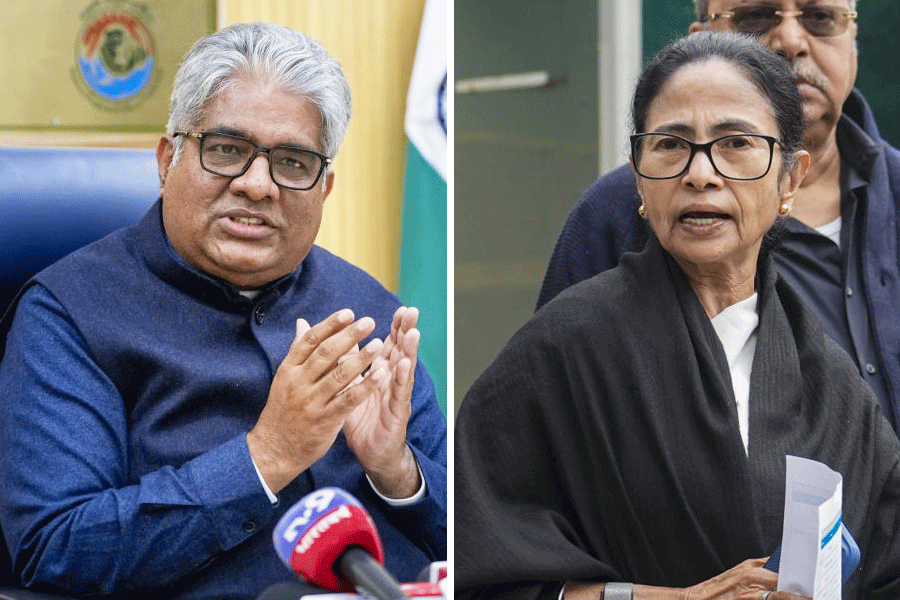 |
I am struck by the fact that there is only one car parked in the driveway to the mansion on Sarat Bose Road. Granted, it’s a Mercedes, but those are rather commonplace these days. And when your son-in-law is a millionaire, you’d expect some evidence of the wealth around you.
Of course, Hotmail founder Sabeer Bhatia’s in-laws’ house in Calcutta is suitably large — with a trapezoidal shape and white exterior. But the spacious living room that I am ushered into isn’t really lavish, though it isn’t quite Spartan either. Everything looks a bit efficient.
Rather like the 43-year-old son-in-law who walks in wearing a green polo tee and jeans, looking relaxed and cheery. Bhatia is in town to promote his latest brainchild — a product called JaxtrSMS that allows people to send and receive free text messages after they’ve downloaded an application. “We’re riding the Internet enabled phone wave,” he says. “Our software doesn’t work on regular phones. We need the Internet connection to transport the data to our server.”
It’s not surprising that the man who gave us free email in 1996 is now offering us free text messages. But Bhatia, who hit the headlines with Hotmail, has been lying low for some years now. Where on earth has he been?
“After I sold Hotmail to Microsoft, I worked at Microsoft for a year,” he replies. “But I couldn’t be at a big company forever, and those were the heady days of the first start-up revolution.”
Bhatia, who studied for a while at BITS, Pilani, before moving to Cal Tech and then earning an engineering degree from Stanford University, says he figured since he’d already been successful as an entrepreneur, he might as well go ahead and become one again. So in 1999, he quit his cushy job at Microsoft and started Arzoo. “The idea at that time was to create the equivalent of eBay for services and ideas. So it was a marketplace for people services and ideas, where people could buy and sell advice.”
This was the era when the dot com bubble was as bloated as it could get. No one imagined the crash that was soon to come. “The year 1999 was crazy. Our costs were extremely high because it was very hard to find good talent those days. People coming out with undergrad degrees were asking for Porsche Carreras as start-up bonuses,” he says. For Bhatia, who grew up in a middle-class home mostly in Pune and Bangalore — with a father who was in the army and a mother who worked in a bank — it seemed like an unreal world.
In late 2000, the bubble burst, and like most other dot com companies, Arzoo went down too. Coming off the high of Hotmail to the bust that was Arzoo, Bhatia soon faded away into the background, making news every now and then only because of the sumptuous arm candies draped around him.
“I thought I had retired. I’ll never retire again in my life. It’s just the most boring thing on the planet when you have nothing to look forward to, not making your life useful. It seems very nice from the outside, but it’s empty.”
Four years ago, Bhatia decided enough was enough. “If your mind dies, if you’re not constantly challenging it, the rest of the body is just useless.” He wanted a challenge — and he put his mind to it. “Forget the end result, I miss the journey. I am actually looking for that high. That’s what all of us entrepreneurs look forward to. You keep trying different ideas, and finally one comes along which instinctively feels like this could be the one that is even bigger.”
And so JaxtrSMS was born. Bhatia believes this will take him beyond the Olympian heights that Hotmail hoisted him to, and is quite obviously proud of it. “In two and half to three weeks since the launch, we have 600,000 global users. We’re growing at 50,000 users a day. So if we continue our current growth, we’ll add one and a half million users every month,” he says.
When he sold Hotmail to Microsoft (making $400 million, incidentally, if reports are to be believed), he only had 10 million subscribers, he points out. “We will have 10 million subscribers by the next quarter at our current rate of growth. This is fabulous, un-freakin’-believable!”
Bhatia Redux is still as enthusiastic as he was when he made a splash with Hotmail. He looks a bit different though, now that he has a clean shaven head. It looks like he has been working out, or at least he’s been hitting the gym in the recent past. He’s filled out the tee shirt well (although there is a bit of a bulge around the stomach).
The fact that he’s shuttling between two countries — he is based in San Francisco but is often in India because of his new venture — is apparent in the way he speaks. His language is often slangy, and his accent is neither American nor Indian. A compromise accent, if you will. No one would have any trouble understanding what he’s saying.
And certainly not when he holds forth on Jaxtr. Bhatia would like the venture to nudge India towards product innovation by young entrepreneurs — an area that the country hasn’t yet made a mark in.
“All the great kind of ideas over there [the US], all the new companies, whether it’s Dropbox, Facebook or Four Square, they’re started by young kids. All 22 to 23 years of age! And that is absent over here. We just don’t trust 22-year-olds to do the right thing here.”
But we’ve got organisations such as Nasscom in India, I point out, referring to the Indian software industry umbrella body whose role is to, among other things, nurture small enterprises in the information technology (IT) sector. There are also companies such as Flipkart — the hugely successful online store started by two young IIT alumni. Surely there is a thriving eco-system for enterprising IT chaps to make a name for themselves in the country?
Not quite, says Bhatia. Indians, he believes, don’t have a “risk taking” mindset, and the few people who have made it big have done so by taking less risky paths.
“You’ve got great companies such as Wipro, Infosys, TCS, BPO businesses. They’ve seen entrepreneurs become successful in all those areas. But the thing is this: can you tell me about one Indian company in the software or hardware business that has conquered the whole world, that the whole world is using? JaxtrSMS is a product that is 100 per cent conceived by Indians and developed in India.”
And the need for IT product entrepreneurs is important, he believes. Day by day, the number of devices that are available to the average consumer with Internet connectivity is growing, and yet people want their data to be available on everything they own.
“Device divergence, but data convergence,” he says. “One giant device simply cannot do everything. It’s not so much about the horsepower, because the horsepower is getting so ridiculously cheap that even your phone will have enough power to do whatever you want. It’s primarily the screen size that differentiates them.”
You can’t use a phone, smart or otherwise, the way you can use a desktop or even a tablet, he argues, primarily because the screen sizes differ. You can’t, for instance, create a Power Point presentation on a phone. He points out that if you’re travelling and need to show a presentation, you will use a laptop. If you’re attending meetings, but don’t need to give any presentations, you might carry your tablet.
“If someone comes up with a device with adaptable screen size — imagine if you could roll your screen, unroll it, use only a particular part of it and so on — then it’s a different situation. It’s the screen size that will determine the different devices that you use.”
I pull him back to JaxtrSMS, and he’s happy to return to his new baby. If JaxtrSMS does become a success, Bhatia hopes its very existence as an IT product produced entirely in India will get investors to loosen their purse strings for newer ideas, and at the same time drive young thinkers to try their hand at creating products.
“We don’t have a history of successful product companies. Only one out of 20 product companies succeed, 19 fail. But the one that succeeds more than makes up for the other 19,” he says.
This one, Bhatia is sure, will be in the club of one. He should know. After all, he’s been there, done that, and tasted both success and failure.










